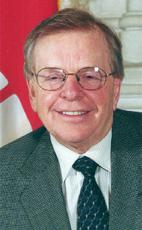Madam Speaker, I think we can have a civil debate about this. After all, this is about democracy. I think we have listened to the opposition members and their concerns. We are not taking anything away from them in that regard.
It is important in this adversarial system, and what we have is an adversarial system, if we on this side feel that the opposition has put forward something that perhaps is not factual, we have a right and a responsibility to respond.
We are not talking about the old system anymore. We are now talking about a new system of electing chairs. The question before the House really is how do we elect chairs? One way is by secret ballot and another way is openly. I support the open system.
I also want the various caucuses to choose their nominees for caucus chairs. I do not want the Prime Minister's Office to make that decision. I do not want the whip to make that choice. I do not want the House leader to make that choice. I want our caucus to make its nominations.
I would imagine when it comes to the Alliance that the caucus members would like to make their choices as opposed to their leader doing it. I am sure the same thing applies to the Bloc, to the Conservative Party and to the New Democratic Party.
Let us not get things mixed up. We are not talking about the old system any more. We are talking about a new system.
Let me again get to the question of referring this matter back to committee for only 15 sitting days. Is that a long time? We have had the old system since 1867. I suppose we could wait another 15 working days so that perhaps we could make some effort to make it right.
I submit that there are concerns and questions that will arise from this new system which we are going to embrace. We are going to embrace it but does the House not think that we should take some time, in this case 15 sitting days, to answer some of the questions and respond to some of the concerns that come out of electing committee chairs?
For example, I will tell the House, I will tell my constituents, I will tell all Canadians that I want within our own Liberal caucus some kind of very responsible nomination system. When we went to a standing committee meeting to elect a chair there would be one Liberal nominee. There would be one, not two, not three, not four. All Liberals within our own caucus would have some say in who would be a chair of a particular standing committee. I cannot think of a more democratic way.
There is another reason I want some time to think about this. I do not know whether the opposition caucuses do, but we do not have any system inside our caucus to consider representation from the regions.
I am from the west. I am a proud westerner. There are quite a few standing committee chairs. Under this new system I want the west to have some opportunity to have some of those committee chairs. To use the old jargon, all I want is our share. I would bet that my colleagues from Atlantic Canada want their share. Ontario does not have to worry as much. Ontario has a huge number of members. God bless them and I thank them for being here.
This is Canada after all. We are a diverse country. We are a country of many regions. We are a country of many different parts. Surely if we are going to make any effort to draw up the committees in a fair and just way, we have to take regional representation into account, gender into account and perhaps some other things into account as well.

